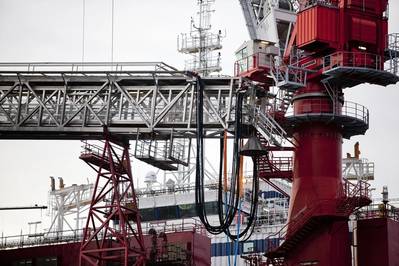DNV GL today published the first industry standard providing guidance on offshore personnel transfer by gangway. DNVGL-ST-0358 will contribute in documenting and securing safe operational performance of offshore gangway solutions and contribute to predictability and transparency within the industry.
Offshore gangways are used as a bridge between two vessels or between a fixed object and a floating installation to transfer people, cargo or equipment. For offshore operations, offshore gangways provide a safe and cost effective alternative to personnel transfer by helicopter, basket transfer or boat landing.
The gangways can take many forms ranging from use for long duration personnel transfer between accommodation units and offshore production assets, to use for short duration transfer between service vessels and unmanned installations such as offshore wind turbines, offshore fish farms and similar installations.
“By addressing a complete set of requirement for materials, strength, safety and functionality as well as testing and recommended in-service follow-up, we have created a specific and dedicated standard to make gangway operation safer and more efficient,” said Per Arild Åland, Business Development, Offshore Classification, DNV GL – Maritime.
Until now, the ISO7061 standard from 1993 has partly served as a reference document by industry for offshore gangway applications despite only addressing ship-to-shore transfers. Next to the ISO07061, offshore gangways are also certified against man-riding crane standards. The limited relevance and lack of offshore specific requirements has driven the development for a dedicated offshore gangway standard providing in-depth and specific guidelines on offshore gangway operation.
In 2013, DNV GL gathered major industry players in a joint industry project to examine offshore gangway transfer operations. Experience gained through this W2W ("walk-to-work") project resulted in the publication of an industry guidance to assist offshore facility operators achieve safe and efficient personnel transfers to/from their facilities via a gangway system on a workboat, ship or semi-submersible.
The new standard, DNVGL- ST-0358, is the result of further development of this work and continuous DNV GL research. It covers the majority of gangway operations offshore including where there is controlled or uncontrolled people flow.
The Standard for Certification of Offshore Gangways reflects the experience gathered on all relevant operating modes and will contribute to predictability and transparency, and at the same time help to reduce risk in personnel transport offshore.
“Finally we can base our work on a set of definite criteria. The industry has for some time needed a dedicated set of guidelines addressing the specifics of offshore personnel transfer through gangway solutions,“ said Christian Bernbo, Business Area Manager Gangway in Marine Aluminium, Norway.
“The new standard for offshore gangways is a welcome addition to DNV GL’s list of guidelines to improve quality, function and safety for offshore personnel. As a launching customer we believe this will be a crucial part in our development of the first compact mobile motion compensating gangway solution,” said Marcel van Meel, General Manager in L-bow Offshore Access Solutions BV, The Netherlands.
The new standard DNVGL-ST-0358 is launched today in a workshop at the London Offshore Accommodation Access conference, where leading industry experts gather to discuss practical guidance on ensuring safe and efficient crew transfer in difficult offshore environments.













